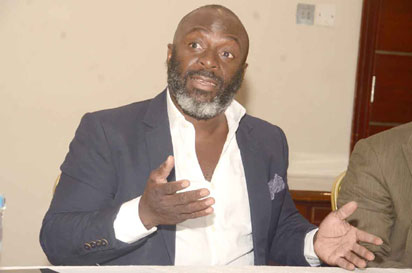
Nigeria has been designed to fail – Presidential aspirant
50 year old Rex Adebanjo was practicing law in the United States until a few years ago when the passion to give back to his motherland fired him to return home. A student activist until he left Nigeria, he was one of those who could not stomach the tyrannical rule of General Sani Abacha and the evils it represented.
So when he decided to return to Nigeria with the aim of giving back to society, one focus was in education.
“There is no way you are going to transform this country without a mass quality education programme,” he said in an interactive session.
Explaining his concept, he added: “The idea was to focus on a programme that could bring cheap but quality education to the masses. The idea was to take a classroom, put a few solar panels on the roof and project unto a television screen, the best classes in the world.
“The idea was because of the deficiency of quality teachers, to now get one of the best teachers in the world from Europe or anywhere, standardize that teaching with visuals that teaches every kid in every village. That was basically what brought me to Nigeria.”
However, his zeal to sell the idea to Nigerian government officials was met with frustrations at all levels. While the concept was generally appreciated, for many of the government officials it was simply not possible to execute. There were many landmines. One notable landmine was the corruption and inefficiency in the government processes that did not allow funding for the project. The other was the detachment of some government officials to such schemes that could raise the quality of education.
There was one practical case as the commissioner of education in one of the Southwest states who thought the scheme too advanced for her state! The commissioner said the government was preoccupied with infrastructure and other landmark projects.
“You can build as many bridges, you might put desks in classrooms but what is going up there (head) is more important,” he said.
“Things like these jolted my consciousness, what is going on?” His response was to take up the gauntlet and address the malaise himself and hence he opted to seek elective office.
Adebanjo is one of the presidential aspirants of the Youth Party, the platform through which he is aiming to become president of the country. Though the party held its primary and well before the deadline stipulated by the Independent National Electoral Commission, INEC, remarkably, he said the party is yet to announce who would be its presidential candidate.
Mr. Adebanjo was still in the waiting game as at the time of this interview last week.
Though he almost sought to cover his parental identity, Rex is the son of Chief Ayo Adebanjo, the frontline nationalist and leader of Afenifere. Even his passion for restructuring or devolution of power betrayed him as he spoke that day.
His simple justification for restructuring is that “because of the structure of our federation and our system, we have actually designed failure into the system,” he said.
“The Fulani herdsman has a more common interest with an IPOB agitator, but they will never realize it and if they were to go into a conflict their interests would be better aligned because they both need liberation.”
Against the perception that the Fulani in Nigeria have been uplifted on account of the Muhammadu Buhari presidency, Mr. Adebanjo sees it differently.
“Buhari is the worst thing to have happened to the Fulani because he has now raised old fears among a whole new generation of Nigerians that is now hostile to the Fulani and the majority of the Fulani who are now going to bear the brunt of that are not benefiting from the supposed power that a Fulani presidency has brought.”
Ahead of his presidential campaign if it eventually gets traction, Mr. Adebanjo has outlined a seven pointagenda he referred to as the Rex Agenda. Top on the list – not surprisingly – is restructuring which would be focused on devolving more powers to the states.
Next is security under which he proposes to triple the pay and number of policemen under a scheme that would make being a policeman an attractive profession and not what it is now presented to be.
The economy which is the third agenda aims to support commercial lending and other measures to boost SMEs and decrease the involvement of government hands in what should be ordinarily left to the private sector.
Other items on the agenda include education, anti-corruption which would entail transparency in government processes, health and finally sustenance of what he sees as present good programmes of government. I
f there is anything he believes would deepen Nigeria’s democracy, Mr. Adebanjo said it would be to simplify the recall process for elected political office holders. “Make recall process much easier so that people don’t need to sit down and think that they are comfortable,” even when the rest of the people who voted for them are in agony!
Credit: Vanguard Nigeria
